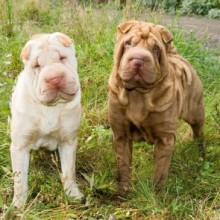Shar Pei
Lifestyle Needs

The Shar Pei breed originates from China where he did work as a hunter and guard dog – also as a fighting dog. For this reason, some Shar Peis may be prone to aggression. In his native country his features (chiefly his wrinkly skin) were much less exaggerated than many Shar Pei you see today. He is a large, lumbering dog who needs to live in a house with a garden. He has short, bristly hair which needs grooming regularly. He needs some exercise every day. In the interests of dog health and welfare, you are advised to avoid the extreme type of Shar Pei in favour of a leaner, more muscular dog with far fewer wrinkles.
Genetic Diversity
(Known as Coefficient of Inbreeding: 'COI'. It should be as low as possible.)
The UK Kennel Club breed average COI is 3.4% - See 'A Beginners Guide to COI'
Gene Pool Size
(Known as Effective Population Size: 'EPS')
n/a
EPS is a measure of how many individuals are contributing genetically to a breed population. It is a measure of the size of the gene pool in a breed. Lower than 100 is considered critical by conservationists and below 50 brings a breed close to extinction. For more information see the Kennel Club article.
Health and Welfare Problems due to Conformation
(Body shape and physical characteristics)
- Skinfold dermatitis (Intertrigo) is common due to intentional breeding for excessive skin folding – causes recurring bouts of skin irritation and soreness.
- His relatively small eyes surrounded by loose, wrinkly skin makes the Shar Pei prone to Entropion (inward rolling of the eyelids, causing irritation, pain, discomfort) Other eye problems also occur due to this dog’s facial conformation.
- Brachycephalic airway obstructive syndrome (BOAS) , caused by skull shape, results in breathing difficulties.
- The Shar Pei’s wrinkles have been found to be linked to Shar Pei fever (autoimmune inflammatory condition – widespread – recurring fever accompanied by aching and swollen joints – one in five dogs go on to develop Amyloidosis – affecting kidneys and liver – chronic inflammation – sometimes fatal)
- Otitis (ear infections) partly due to selection for tiny ears/ear canals which hinder air-flow
BVA/KC Health Schemes: www.bva.co.uk/chs
- Hip dysplasia: breed 5 year mean score 11 (parents should be lower)
- Elbow dysplasia: score ideally O:O)
- Eye testing brachycephalic dogs should be routine as the foreshortened skull/face can cause substantial welfare problems for the whole of a dog’s life.
The Shar Pei is one of the 15 high profile breeds designated by the Kennel Club as requiring particular monitoring by reason of visible conditions which may cause health and welfare concerns
Estimated Breeding Values (EBVs) : No EBVs are currently available for this breed
www.thekennelclub.org.uk/about-ebvs
DNA Tests Available
DogWellNet and IPFD Harmonisation of Genetic Testing for Dogs (HGTD)
www.dogwellnet.com/breeds
- Primary Open Angle Glaucoma (POAG) / Primary Lens Luxation (PLL)
- SPAID Shar Pei Autoinflammatory disease
Availability of a DNA test does not mean that it is always necessary or even desirable for breeders to use this test.
Other Breed-Specific Health Screening Schemes
None known
Ask the breeder to show you the certificates for the above tests/screening for both parents. If any of the above tests have not been considered necessary by the breeder (and there may be good reasons), ask her to explain why.
Other Diseases Reported
(For which there are currently no genetic or screening tests for sire or dam)
- Atopy
- Allergies
- Amyloidosis
- Familial Shar Pei Fever (SFS/SHS)
- Arthritis
- Cutaneous Hyaluranosis (HCH)
- Dermatitis
- Recurrent otitis
- Swollen Hock syndrome
- Hypocobalaminaemia (low levels of B12)
- Panosteitis
- Patellar luxation
- Cancers
- Cherry Eye
Ask the breeder about the medical history of the parents, grandparents and great grandparents. Consider carefully whether to purchase a puppy if some of these or other diseases are in the family line.
Ask about the breeder’s policy in cases of serious genetic diseases occurring to your puppy in later life. Good breeders will request to be informed of such events in order to improve future breeding decisions.
You are strongly advised to buy from a breeder who uses (or is prepared to use) the AWF Puppy Contract and Puppy Information Pack (PIP): www.puppycontract.org.uk
The breeder should also be familiar with the CFSG/DBRG Code of Practice for Dog Breeding